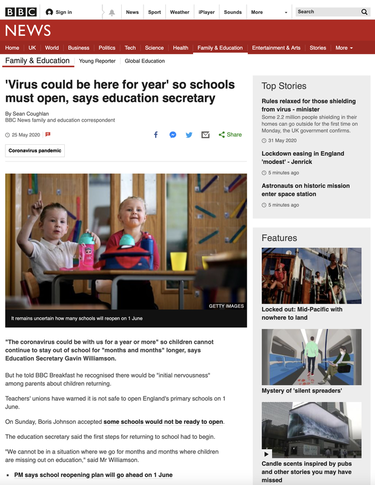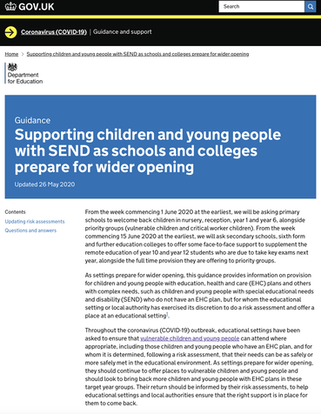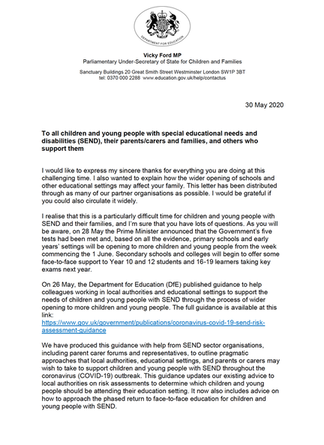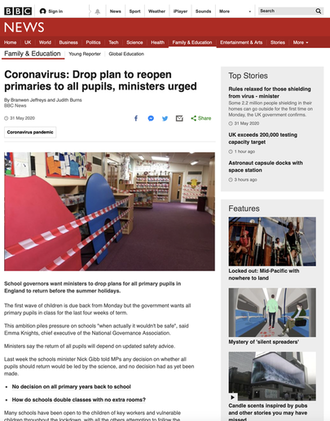|
by Douglas Silas, specialist SEN solicitor 1. What has happened this week? On Monday, there was an article on the BBC's website entitled: "'Virus could be here for year' so schools must open, says education secretary”, which said: "The coronavirus could be with us for a year or more" so children cannot continue to stay out of school for "months and months" longer, says Education Secretary Gavin Williamson. But he told BBC Breakfast he recognised there would be "initial nervousness" among parents about children returning. Teachers' unions have warned it is not safe to open England's primary schools on 1 June. On Sunday, Boris Johnson accepted some schools would not be ready to open. The education secretary said the first steps for returning to school had to begin. "We cannot be in a situation where we go for months and months where children are missing out on education," said Mr Williamson. This has not persuaded teachers' unions - with no sign of a resolution to the stand-off over bringing increasing numbers of children into schools. Geoff Barton, leader of the ASCL head teachers' union, said the government had "not done a good job in building confidence in its plans". Ministers were failing to win "trust and confidence", said Patrick Roach, leader of the Nasuwt teachers' union. Mr Williamson told BBC Breakfast that he recognised there would be hesitation among parents. "We do realise there will be an initial nervousness about the return of schools," he said. And he said it was right that there would be no penalties for parents who decided to keep children at home. Asked whether parents should now rely on their "instincts" rather than official guidance, he said he hoped that parents would start to send their children back to school. He said the guidance for returning to school ensured a "maximum amount of safety" - and going back would be important for children's well-being as well as helping them to catch up on lost lessons. Schools have remained open for the children of key workers and vulnerable children - and the government's plan is for all pupils in Reception, Year 1 and Year 6 to return to school from 1 June. But many local authorities have already indicated that their schools will not be ready to open, or that schools will have their own variations on which pupils will return. Mr Williamson said there was no reason why most schools should not open - but gave no indication of any sanctions for those that did not. The first children returning to secondary school, in Years 10 and 12, will begin on 15 June. School leaders have questioned the feasibility of the next stage of reopening, which would have all primary children back in school together for the last month of term. The Department for Education says this part of the plan is now "under review". In Scotland and Northern Ireland there are plans for a phased return to school for pupils, starting in August. Schools in Wales will not go back on 1 June, but a date has not yet been set. On Tuesday, the Government then issued guidance called: "Supporting children and young people with SEND as schools and colleges prepare for wider opening”, which stated: “From the week commencing 1 June 2020 at the earliest, we will be asking primary schools to welcome back children in nursery, reception, year 1 and year 6, alongside priority groups (vulnerable children and critical worker children). From the week commencing 15 June 2020 at the earliest, we will ask secondary schools, sixth form and further education colleges to offer some face-to-face support to supplement the remote education of year 10 and year 12 students who are due to take key exams next year, alongside the full time provision they are offering to priority groups. As settings prepare for wider opening, this guidance provides information on provision for children and young people with education, health and care (EHC) plans and others with complex needs, such as children and young people with special educational needs and disability (SEND) who do not have an EHC plan, but for whom the educational setting or local authority has exercised its discretion to do a risk assessment and offer a place at an educational setting1. Throughout the coronavirus (COVID-19) outbreak, educational settings have been asked to ensure that vulnerable children and young people can attend where appropriate, including those children and young people who have an EHC plan, and for whom it is determined, following a risk assessment, that their needs can be as safely or more safely met in the educational environment. As settings prepare for wider opening, they should continue to offer places to vulnerable children and young people and should look to bring back more children and young people with EHC plans in these target year groups. Their return should be informed by their risk assessments, to help educational settings and local authorities ensure that the right support is in place for them to come back. From 1 June we will be asking special schools and hospital schools to work towards a phased return of more children and young people, without a focus on specific year groups and informed by risk assessments. From 15 June, we will be asking specialist post-16 institutions to work towards a phased return of young people, without a focus on specific year groups or proportion of learners and informed by risk assessments….” By the end of the week, we heard that the Government had also issued an extension of their previous Notice under the Coronavirus Act 2020 to the end of June 2020 to relax legal duties in relation to the laws surrounding SEN and in the past couple of days, Vicky Ford MP, the Parliamentary Under Secretary of State for Children and Families, has issued another letter addressed again to: "To all children and young people with special educational needs and disabilities (SEND), their parents/carers and families, and others who support them", which stated: “I would like to express my sincere thanks for everything you are doing at this challenging time. I also wanted to explain how the wider opening of schools and other educational settings may affect your family. This letter has been distributed through as many of our partner organisations as possible. I would be grateful if you could also circulate it widely. I realise that this is a particularly difficult time for children and young people with SEND and their families, and I’m sure that you have lots of questions. As you will be aware, on 28 May the Prime Minister announced that the Government’s five tests had been met and, based on all the evidence, primary schools and early years’ settings will be opening to more children and young people from the week commencing the 1 June. Secondary schools and colleges will begin to offer some face-to-face support to Year 10 and 12 students and 16-19 learners taking key exams next year. On 26 May, the Department for Education (DfE) published guidance to help colleagues working in local authorities and educational settings to support the needs of children and young people with SEND through the process of wider opening to more children and young people. The full guidance is available at this link: https://www.gov.uk/government/publications/coronavirus-covid-19-send-risk-assessment-guidance We have produced this guidance with help from SEND sector organisations, including parent carer forums and representatives, to outline pragmatic approaches that local authorities, educational settings, and parents or carers may wish to take to support children and young people with SEND throughout the coronavirus (COVID-19) outbreak. This guidance updates our existing advice to local authorities on risk assessments to determine which children and young people should be attending their education setting. It now also includes advice on how to approach the phased return to face-to-face education for children and young people with SEND. I want to assure you that safety will always be our primary concern. Local authorities and educational settings should work with families to bring children and young people back to face-to-face education to ensure they receive the support that every child or young person deserves. This new guidance sets out that children and young people with SEND in mainstream and Alternative Provision settings who have not been attending and are in eligible year groups should experience the same return to their school/college or contact with their teachers as their peers without SEND in the same year group. We recognise that each individual child with SEND has their own needs, so decisions should be based on each child’s risk assessment with families and schools working together. Special schools, special post-16 institutions and hospital schools should work towards welcoming back as many children and young people as can be safely catered for in their setting based on risk assessments but not using their year group as a primary deciding factor. Educational settings and local authorities should keep risk assessments up to date, to ensure they are able to offer places to pupils and students, whatever year group they are in, where circumstances have changed. I know that there has been a huge amount of change at this time, so if you want more details, you may also wish to read further guidance including: • Actions for education and childcare settings to prepare for wider opening from 1 June 2020 and actions for FE colleges and providers during the coronavirus outbreak, which sets out the overarching aims and principles of wider opening and the next steps for education and childcare providers. • Guidance on implementing protective measures in education and childcare settings. • Guidance on safe working in education, childcare and children’s social care, including the use of PPE in education, childcare and children’s social care settings during the coronavirus outbreak. • Guidance on isolation in residential educational settings. • Guidance on supporting vulnerable children and young people during the coronavirus outbreak. • Guidance on the changes to the law on education, health and care needs assessments and plans due to coronavirus. I realise that whilst the coronavirus pandemic has affected us all, children and young people with SEND and their families have often faced particularly acute challenges. This is why I was happy to announce on 19 May that the Family Fund will receive funding of £37.3 million in 2020-21. The Family Fund provides grants to families on low incomes who have children with disabilities or severe medical conditions, and this funding includes £10 million which has been allocated to help families in response to the Covid-19 pandemic. More details can be found here: https://www.gov.uk/government/news/37-million-to-support-children-with-complex-needs You can also keep up to date by regularly checking the gov.uk webpages and if you want to speak to an advisor from the DfE, please do call the DfE Coronavirus helpline which we have established for local authorities, providers and parents. The number is 0800 046 8687, and lines are open 8am-6pm (Monday – Friday), and 10am – 4pm (Saturday and Sunday). The Council for Disabled Children has also pulled together a wide set of resources to respond to frequently asked questions: https://councilfordisabledchildren.org.uk/help-resources/resources/covid-19-support-and-guidance. Finally, I would like to express my personal gratitude towards all those in the SEND sector for continuing to care for, teach and support vulnerable children and young people in these difficult times.” There has already been a bit of a backlash to this which is probably best summarised in another article which I saw earlier today on the BBC's website entitled: " Coronavirus: Drop plan to reopen primaries to all pupils, ministers urged", which states: “The first wave of children is due back from Monday but the government wants all primary pupils in class for the last four weeks of term. This ambition piles pressure on schools "when actually it wouldn't be safe", said Emma Knights, chief executive of the National Governance Association. Ministers say the return of all pupils will depend on updated safety advice. Last week the schools minister Nick Gibb told MPs any decision on whether all pupils should return would be led by the science, and no decision had as yet been made. Many schools have been open to the children of key workers and vulnerable children throughout the lockdown, with all the others attempting to follow the primary curriculum at home. From Monday, the government wants all pupils in Reception, Year 1 and Year 6 to return to their classrooms, with no more than 15 pupils per class. This means every class of 30 would have to be spread across two classrooms. Under these rules, if all year groups went back, there would not be enough classrooms in the vast majority of primary schools. Ms Knights has written to the education secretary, Gavin Williamson, "asking him to review and to drop" the expectation that all primary pupils should be back at school for the last four weeks of term. "Unless something dramatic changes very soon in terms of the government's scientific and medical advice, it will simply not be possible for primary schools to invite all pupils back for a whole month of education before the summer holidays," she told the BBC. "Indeed many of them won't be able to invite all pupils back at all before the summer holidays... "It is adding to uncertainty for parents, but also extra pressure on school leaders and governing boards who think that they need to try and do this when actually it wouldn't be safe." Mr Williamson has not as yet responded to the letter. Kerry Hill, head teacher at Eyres Monsell primary school in Leicestershire, told BBC Breakfast that her school would not reopen until the middle of June. She said that even then, it will be closed one day a week to all pupils apart from the children of key workers for deep cleaning. A one-way system will be put in place and any non-essential items that could potentially spread the virus, such as toys and soft furnishings, are being removed. "In our classrooms we can't even fit 15 in and still observe social distancing," she said. "In terms of the logistics, rearranging the entire school and having the available staff to come in and take all of those groups has been incredibly challenging - as well as the logistics of how are we going to do regular cleaning across the day." She added: "It is not just about the safety of minimising risks. We know parents are scared, anxious, and our staff a worried, so we're really trying to put in place measures that help keep that trust and confidence." Just over 2,350 governors shared their plans for the return of pupils with the BBC. Many say, even with the limited numbers due to return in the first phase, they are already having to ask pupils to attend part-time, due to space constraints and the need for deep cleaning to keep the virus at bay. Of the governors who answered a BBC snapshot questionnaire: About four in five said they were able to accept pupils from all the eligible year groups. About a third of the schools are planning rota systems, for example with one half of pupils attending school for two days at the start of the week, and the other half for two days at the end, with a day for deep cleaning in between. There are wide variations in the numbers of parents who have committed to sending their children to school from Monday, with some schools expecting almost everyone, and others just a handful. Of the 2,350 governors asked whether it would be possible to have all pupils back for the last four weeks of term, 1,682 said this was unlikely or very unlikely. "It would be physically impossible to bring all pupils back with reduced class sizes - we do not have the extra classrooms or staff to accommodate them safely," one governor wrote. "It is going to be challenging enough to get Reception, Year 1 and Year 6 pupils back into school, respecting all of the social distancing and also providing spaces for key worker and vulnerable children. This will take up all the classroom space in the school and use up all of the staff who are available," wrote another. However, another expressed frustration at being unable to welcome all children back to school immediately, saying parents "need a break and the children are getting feral". Overall, governors expressed concerns about the pressure placed on themselves and on headteachers by the pandemic. "I can only say that the professionalism of our team has shone through and for everyone's sake we hope the advice is right and that safe and effective learning returns for some and continued remote learning carries on for others," said Nick Horslen, chair of governors at Kings Wood Primary and Nursery School in High Wycombe. "The situation is a long way from ideal but the creativity and determination to help children is the constant priority." Schools in Wales do not have a date for returning and schools in Scotland and Northern Ireland are going back in August. 2. What does this all mean? Again, I'm not going to share any thoughts with you today, as I feel a bit conflicted still because I can see both sides of the argument is sometimes you find that both people can be right! One thing I'm sure of though is that this debate is going to continue probably for some time to come. 3. Where can I find further information?
There isn't really much more that I can say in this update now. However, as I always like to do at the end of my updates, I would again remind you of the very useful resources and information provided on the following websites: - IPSEA - Council for Disabled Children - Contact - Scope - Special Needs Jungle I would also highlight again the fact that you can now get digital copies of the magazines: SEN Magazine and Autism Eye which are both very helpful to any parents or professionals involved with children/young people with SEN. Remember also, that there are other videos on this website, especially the one at the top of this page which explains the coronavirus and its effect clearly to children. Keep safe until next week. With best wishes Douglas P.S I understand that there are a number of educational or other useful resources now on the web - I would be very grateful if you could let me know of any that people are finding useful, so that I can direct others to them. P.P.S. I also want to highlight again the fact that there are currently a lot of scams out there, both online and through texts/WhatsApps. Please be extremely careful and help yourself and others not to become victims. You can learn more at: www.FriendsAgainstScams.org.uk. Comments are closed.
|
Archive
March 2022
|
© Douglas Silas Solicitors 2005-24
Authorised and Regulated by the Solicitors Regulation Authority (SRA no: 643718)
‘Douglas Silas Solicitors’ is the trading name of ‘Douglas Silas Solicitors Limited’, a limited company registered in England & Wales (company no: 10689991), whose registered office is Gable House, 239 Regents Park Road, Finchley, London, United Kingdom, N3 3LF. A list of members/directors may be inspected at our office.
Authorised and Regulated by the Solicitors Regulation Authority (SRA no: 643718)
‘Douglas Silas Solicitors’ is the trading name of ‘Douglas Silas Solicitors Limited’, a limited company registered in England & Wales (company no: 10689991), whose registered office is Gable House, 239 Regents Park Road, Finchley, London, United Kingdom, N3 3LF. A list of members/directors may be inspected at our office.






 RSS Feed
RSS Feed







